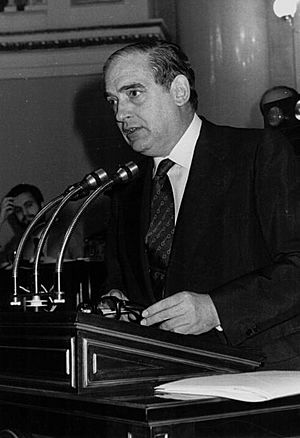Antonio Fontán facts for kids
Quick facts for kids
Antonio Fontán
|
|
|---|---|

Antonio Fontán, the Spanish journalist who fought for press freedom. He later became the first President of the Senate, following the adoption of a democratic constitution.
|
|
| Born |
Antonio Fontán Pérez
15 October 1923 |
| Died | January 14, 2010 (aged 86) |
| Nationality | Spanish |
| Alma mater | University of Seville |
| Occupation | Journalist, politician |
Antonio Fontán Pérez (born October 15, 1923 – died January 14, 2010) was an important Spanish journalist and politician. He is known for bravely fighting for press freedom in his country. He also helped create Spain's democratic government.
Antonio Fontán was the editor of a newspaper called Madrid from 1967 to 1971. This newspaper often spoke out against the strict government of Francisco Franco. Because of this, the government tried to stop the newspaper. Fontán was taken to court many times and fined. In 1971, the government forced him to resign and closed the paper. Fontán's strong belief in free speech during these years made him a hero in Spanish journalism.
After Franco's rule ended, Spain became a democracy. In 1977, Fontán was elected to the Spanish Senate. This was part of Spain's first democratic elections. He helped write the Spanish Constitution of 1978. This important document made sure that freedom of speech and information were basic rights for everyone. He also worked as a government minister from 1979 to 1982.
Antonio Fontán founded a magazine called Nueva Revista de Política, Cultura y Arte in 1990. He was its president and publisher until he passed away. The International Press Institute (IPI) has honored him as one of the "Heroes of Press Freedom."
Early Life and Education
Antonio Fontán was born in Seville, Spain, on October 15, 1923. He went to the University of Seville. There, he earned a special degree in classical languages in 1948. He also studied journalism in Madrid.
In 1954, Fontán started a monthly magazine called Nuestro Tiempo. Before joining the newspaper Madrid in 1966, he directed another weekly magazine. He joined Madrid after a new law was passed that removed some government control over newspapers.
Fighting for Press Freedom
Fontán became the editor-in-chief of Madrid in April 1967. He quickly learned that even with new laws, true press freedom was hard to achieve. The newspaper Madrid became unpopular with the government. It reported on topics the government didn't like, such as student protests and workers' rights.
Fontán and his newspaper faced many problems for defending democracy. Between 1967 and 1968, the paper was investigated 12 times. In May 1968, Madrid was shut down for four months. This caused big financial problems for the newspaper. Even so, they continued to pay their staff during this time.
After Madrid started publishing again in September 1968, the government continued to cause trouble. In October 1971, the government demanded that Fontán be replaced. They wanted a journalist who supported the government to take his place. If the newspaper refused, they threatened to close it permanently.
The newspaper's owner, Rafael Calvo Serer, refused to agree. The journalists at Madrid formed a special group. This group was the first of its kind in Spain. They wanted to protect their independence and keep their editor.
The government then started an investigation into the newspaper's ownership. They claimed there were "irregularities." On November 25, 1971, after Madrid published an article criticizing a high-ranking official, the government officially closed the newspaper. They said it was because of ownership issues.
Many people in Spain were upset by the closing of Madrid. A Catholic newspaper called Ecclesia said, "To close an economically sound and well-read paper is murder." The journalists and workers of Madrid decided to support their management. They refused to let the government take over the newspaper. They even said they would sell their printing presses to pay their staff rather than lose their independence.
After Franco's death in 1975, Spain became a democracy again. The Supreme Court said that the order to close Madrid was wrong. The government was ordered to pay money to the newspaper. However, it was not enough to restart the daily paper.
Political and Academic Work
In June 1977, Fontán was elected to the Senate. This was during Spain's first democratic elections. He was one of the people who wrote the Spanish Constitution of 1978. This constitution made freedom of expression and information basic rights. He also served as a government minister from 1979 to 1982.
Besides journalism and politics, Fontán also worked in academia. In 1958, he started the first university-level journalism school in Spain. This was at the University of Navarra.
In 1984, he became an honorary member of the International Press Institute. He was also named one of the institute's 50 World Press Freedom Heroes of the 20th century.
Fontán founded and led Nueva Revista de Política, Cultura y Arte. This was a magazine about current events.
In July 2008, King Juan Carlos I gave him the title of Marquess of Guadalcanal. This was to honor his important work for political freedom and peace in Spain.
See also
 In Spanish: Antonio Fontán para niños
In Spanish: Antonio Fontán para niños
 | Selma Burke |
 | Pauline Powell Burns |
 | Frederick J. Brown |
 | Robert Blackburn |

